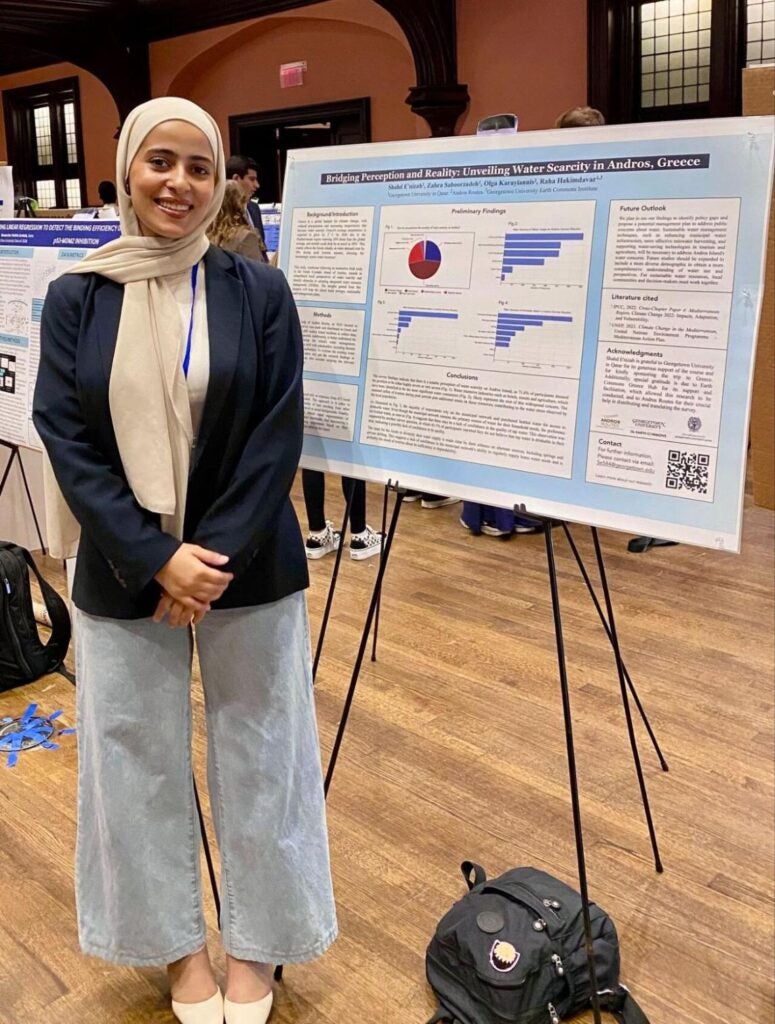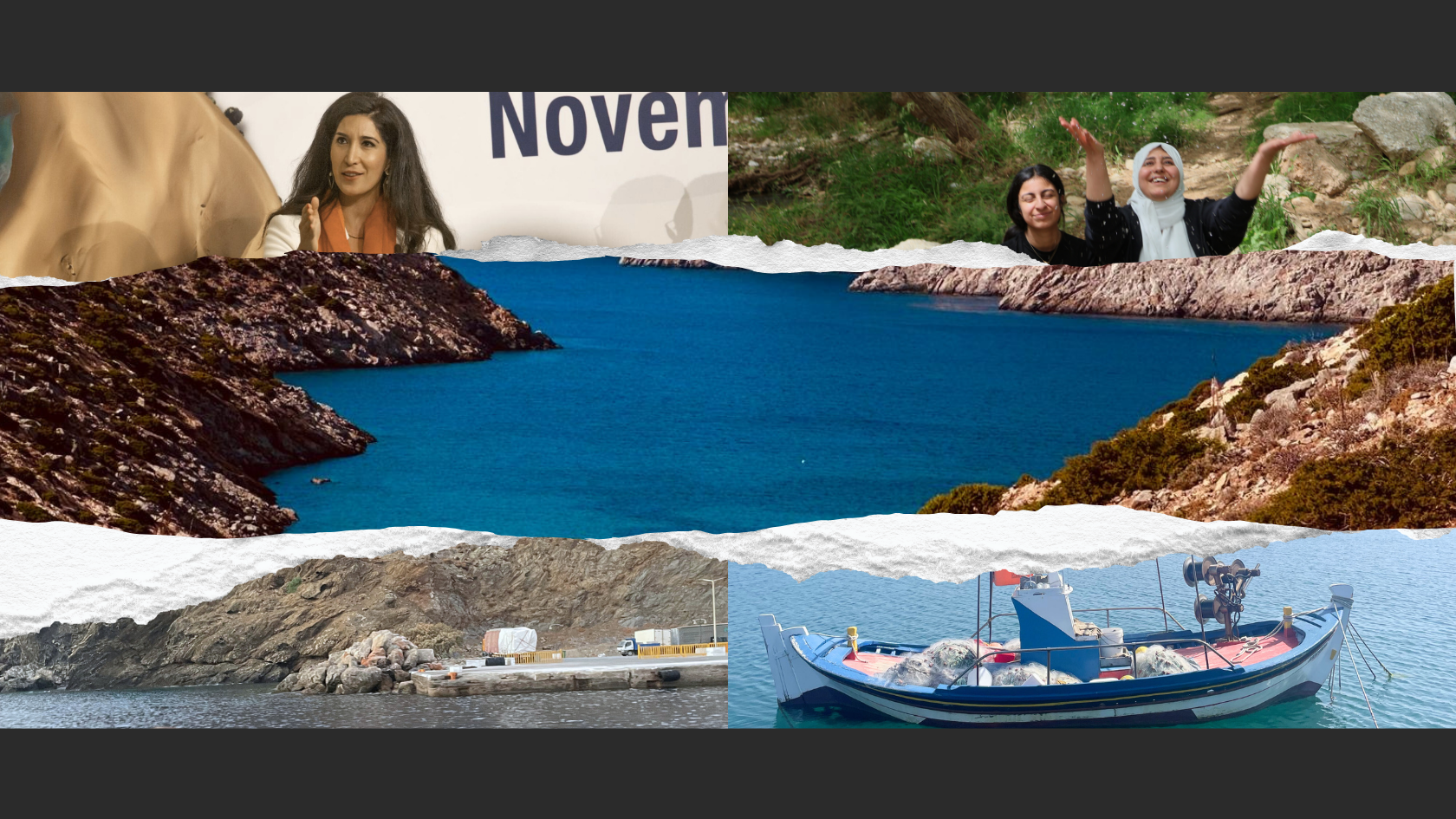Bridging Continents and Currents: How Water and the Environment Shape Georgetown’s Global Leadership
For Dr. Raha Hakimdavar, it all began with water. As a child, it was “her first fascination,” and she first began ceremonially collecting rainfall in pots and pans in her semi-arid hometown of Esfahan in Iran. Eventually, Dr. Hakimdavar received her formal training in civil engineering and hydrology, but her work has long been interdisciplinary–a result of the nature of water itself.
“Water is so fundamental to everything on Earth that I think understanding and addressing the challenges around water help us to understand and address the challenges around so many other things: food, energy, politics, societal value systems as they change,” Dr. Hakimdavar explains. Indeed, Dr. Hakimdavar’s work has taken her around the world and integrated policy and practice, including conducting work that led to the revision of UN Environment Programme’s reporting methodology for the Sustainable Development Goal on Water and Sanitation and the creation of a water security modeling framework currently employed by the US Government.
Water is so fundamental to everything on Earth that I think understanding and addressing the challenges around water help us to understand and address the challenges around so many other things: food, energy, politics, societal value systems as they change.
Dr. Raha Hakimdavar
Dr. Hakimdavar joined the Earth Commons—Georgetown University’s Institute for Environment & Sustainability (ECo)—team in 2023 as the Senior Advisor to the Deans of ECo and Georgetown University in Qatar (GU-Q) in the areas of environment and sustainability in 2023. In this role, she is a key actor in the growing collaboration between ECo and GU-Q. The collaboration has been an intuitive outcome of GU-Q’s increasing interest in fostering regional and international environmental leadership and ECo’s growing faculty, student, and programmatic resources which seek to transform the university into a living laboratory with a deepening global presence.
GU-Q’s attentiveness to environmental education is a result of regional necessity. After seeing rapid development starting in the 90s as a result of state-run liquid natural gas extraction, Qatar has faced growing environmental challenges. The issues stem from an already harsh climate exacerbated by intense population growth and climate change. As Qatar works to respond to its own environmental challenges, it also seeks to lead the way across the region where many of its neighbors face similar concerns. For example, as Dr. Hakimdavar highlights, Qatar’s evolving success in using desalination to address pressing water scarcity and food security challenges domestically can serve as a model for other arid regions.
Above: Dr. Raha Hakimdavar, Senior Advisor to Deans Safwan Masri of GU-Q and Peter Marra of the Earth Commons Institute, welcomes attendees to the Sustaining the Oasis conference and introduces the deans’ remarks. “With COP28 just weeks away, ours is an incredibly timely dialogue and the high-level findings from this conference will be shared with the COP28 Presidency team in support of water-related efforts,” she said. Later, Dean Masri reflects, “One of the greatest values of dialogues like Hiwaraat is to kickstart important agendas for the future, to bring together people who care about common issues.”
Georgetown’s very presence in Qatar was at the request of Qatar Foundation, which set out to invest its oil and natural gas wealth to establish a hub of knowledge production and research that could support the transition towards a sustainable knowledge based society. Georgetown was one of eight prestigious universities to participate in the Education City initiative, offering the same degree as their home campuses while benefiting from a presence in the heart of the Global South. Since 2005, GU-Q has offered a Bachelor of Science in Foreign Service through the Georgetown School of Foreign Service as well as high school programming and executive education.
ECo and GU-Q’s increased collaboration enters a chapter of regional environmental cooperation already underway–and primed for deepening collaboration. Both institutions have fostered faculty that engage on environmental topics from across the spectrum: ethics, history, culture, politics, and science. GU-Q and ECo’s collaboration connects these faculty so that they can better tackle environmental challenges in interdisciplinary ways. Students benefit from this collaboration because they witness and are a part of the international and interdisciplinary exchange of cultures and ideas. In the first year and a half of collaboration, key strides have been taken to expand academic programming and build relationships with prominent regional players.
Dr. Hakimdavar has been working on expanding academic programming along with faculty on GU-Q’s campus such as Dr. James Olsen. Dr. Olsen is a philosopher and environmental ethicist who transitioned from the campus in Washington, DC to Qatar several years ago. In his role as Associate Director for Pedagogy and Innovation, Dr. Olsen supports sustainability programming, including bringing a cohort of ten students to COP28 in the UAE. Students attended discussions and participated in panels as delegates through the International Youth Climate Delegate Program and the official youth constituency of the UN Framework Convention on Climate Change. Dr. Hakimdavar hopes to partner with ECo to bring more faculty expertise on the environment to GU-Q. The goal is for a two-way exchange of faculty and students between GU-Q and the main campus that will allow for more cultural and international education opportunities.
End of carousel collection.
ECo also collaborated with GU-Q on two of their recent Hiwaraat Conferences. Dr. Hakimdavar, Dr. Olsen, and two other faculty from DC – Professors Marcus King and Mark Giordano – played a pivotal role in organizing and speaking at the 2023 conference, Sustaining the Oasis: Envisioning the Future of Water Security in the Gulf, which delved into the historical and future significance of water in the region while charting a path towards sustainable water security that meets both human and ecological needs. World-renowned author, journalist, and thought leader, Malcolm Gladwell, opened the conference. High-level panels focused on water security and stability in the region, including the impact on food supply, with insights from international and regional speakers, including H.E. Abdul-Rahman Al-Eryani, Former Minister of Water and Environment in the Republic of Yemen, currently at Earthna, and Mohammed Hossein Emadi, former Ambassador and Permanent Representative of Iran to the UN’s food programs.
Dr. Hakimdavar herself designed and offered two immersive courses on the environment in collaboration with ECo. The first was an experimental, immersive summer course in Greece in partnership with the ECo Greece hub. Students conducted site visits across the country with the goal of understanding the impacts of climate change on the country and ultimately designing and implementing a research project. The resulting research projects have received significant traction, including an invitation to present a case study on water scarcity in Andros, Greece developed byGU-Q students Shahd E’nizah and Zahra Saboorzadeh at the University of Pennsylvania’s National Research Conference. ECo always aims to move directly from learning to putting ideas into action: collaboration opens the doors that make this all the more possible.
Students gather with Dr. Hakimdavar during a field visit for the “Adaptation in a Climate Hotspot” course in Greece in partnership with the ECo Greece hub. “These lessons resonate beyond the island, speaking to the broader challenges we face with climate change,” said participant Zainab Ayub.
The second immersive course took place in Qatar around the themes of water, climate and urban ecology. GU-Q students went on a sustainability tour of Education City and a tour of a desalination site with talks by experts from Earthna—a non-profit policy research and advocacy center, established by Qatar Foundation—Qatar Energy and Environment Research Institute, and fellow Education City university Hamad Bin Khalifa University. The class also undertook a hands-on restoration day at a local mangrove site. Students in this immersion undertook a research design project with the prompt to “Design the Sustainable Arid City of the Future.” This is a core example of GU-Q’s position within an ecosystem of environmental actors that are a natural partnership with the work of ECo.

GU-Q student Shahd E’nizah presents her and her classmate Zahra Saboorzadeh’s case study on water scarcity in Andros, Greece at the University of Pennsylvania’s National Research Conference.
Dr. Hakimdavar has also been hard at work representing GU-Q and ECo in local and international conferences to speak to the broader regional concern and interest in sustainability. Dr. Hakimdavar participated in the 2023 MENA Climate Week (the regional summit for the Middle East and North Africa in preparation for COP28) and the International Union for the Conservation of Nature – West Asia regional meeting, underscoring the importance of regional partnership. “Collaborative efforts will allow these nations to pool their experiences, best practices, and innovative solutions to address common issues more effectively,” Dr. Hakimdavar wrote in a recent Time op-ed. “Importantly,” she continues, “[collaboration] enables the region to develop solutions that are culturally appropriate and uniquely suited to the Gulf.”
At the 2024 Our Ocean Conference in Greece, Dr. Hakimdavar spoke alongside Secretary John Kerry on how universities can foster multi-disciplinary knowledge for ocean sustainability. Greece, like Qatar, faces extreme water scarcity and has looked to Qatar on the issue of desalination.
In Qatar, Dr. Hakimdavar represented the GU-Q and ECo collaboration in the Qatar National Dialogue on Climate Change in October 2024. She participated in two high-level panels discussing sustainable supply chains and circular economy principles for efficient water and waste management. She also participated in the Arab Youth Climate Movement conference, which connects young people from schools, universities and across the community to advocate for greater environmental education and research in Qatar.
When Dr. Hakimdavar considers the role that Georgetown plays at GU-Q and across the region, she sees both the “opportunity for Georgetown to bring together regional voices and for Georgetown to share the successes and stories of the region globally”—both are essential for educating environmental leaders and finding the solutions necessary for the environmental issues afoot in the region. “These relationships are key to establishing Georgetown as an emerging leader in interdisciplinary environmental education and research.”





